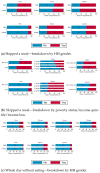Food Insecurity, Safety Nets, and Coping Strategies during the COVID-19 Pandemic: Multi-Country Evidence from Sub-Saharan Africa
- PMID: 34639298
- PMCID: PMC8508557
- DOI: 10.3390/ijerph18199997
Food Insecurity, Safety Nets, and Coping Strategies during the COVID-19 Pandemic: Multi-Country Evidence from Sub-Saharan Africa
Abstract
The COVID-19 pandemic has affected food security across the world. As governments respond in different ways both with regards to containing the pandemic and addressing food insecurity, in parallel detailed datasets are being collected and analysed. To date, literature addressing food insecurity during the pandemic, using these datasets, has tended to focus on individual countries. By contrast, this paper provides the first detailed multi-country cross-sectional snapshot of the social dimensions of food insecurity during the COVID-19 pandemic across nine African countries (Chad, Djibouti, Ethiopia, Kenya, Malawi, Mali, Nigeria, South Africa, and Uganda). Econometric analysis reveals that female-headed households, the poor, and the less-formally educated, appear to suffer more in terms of food insecurity during this global pandemic. Importantly, our findings show that the negative consequences of the pandemic are disproportionately higher for lower-income households and those who had to borrow to make ends meet rather than relying on savings; impacts are country-specific; and there is considerable spatial heterogeneity within country food insecurity, suggesting that tailored policies will be required. These nine countries employ both food and cash safety nets, with the evidence suggesting that, at least when these data were collected, cash safety nets have been slightly more effective at reducing food insecurity. Our results provide a baseline that can be used by governments to help design and implement tailored policies to address food insecurity. Our findings can also be used as lessons to reshape policies to tackle the heterogeneous impacts of climate change.
Keywords: COVID-19; food insecurity; multi-country; socioeconomic determinants.
Conflict of interest statement
The authors have no conflict of interest to declare.
Figures














References
-
- World Bank . Global Economic Prospect. World Bank; Washington, DC, USA: 2020. - DOI
-
- Ceballos F., Kannan S., Kramer B. Impacts of a national lockdown on smallholder farmers’ income and food security: Empirical evidence from two states in India. World Dev. 2020;136:105069. doi: 10.1016/j.worlddev.2020.105069. - DOI
-
- World Food Summit . Rome Declaration on World Food Security. World Food Summit; Rome, Italy: 1996.
MeSH terms
LinkOut - more resources
Full Text Sources
Medical
Research Materials

